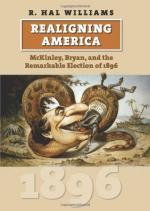|
This section contains 531 words (approx. 2 pages at 300 words per page) |

|
Election of 1896
Summary: Describes the Election of 1896 between William McKinley and William Jennings Bryan. Concludes that it is a pivotal election because it helped urbanize the United States and it was the first election after the Depression of 1893.
The election of 1896 matched up to clearly diverse candidates in Robert McKinley and Williams Jennings Bryan. McKinley, who eventually won the election, was a Republican who was in favor of industrializing the United States. On the contrary, William Jennings Bryan, a Democrat, tried to win the election by campaigning all across the country, which was a different strategy at the time. The Election of 1896 was a pivotal election because it helped urbanize the country and it was the first election after the Depression of 1893.
McKinley, a liberal congressman and governor of Ohio, was born in 1843. He won the election in 1896 to become the 23rd President of the U.S.. McKinley attracted the working class and the urban middle class. He ran a "front porch" campaign meaning that he stayed at home during his campaign and he made speeches on his front steps. McKinley wanted to industrialize the United...
|
This section contains 531 words (approx. 2 pages at 300 words per page) |

|


